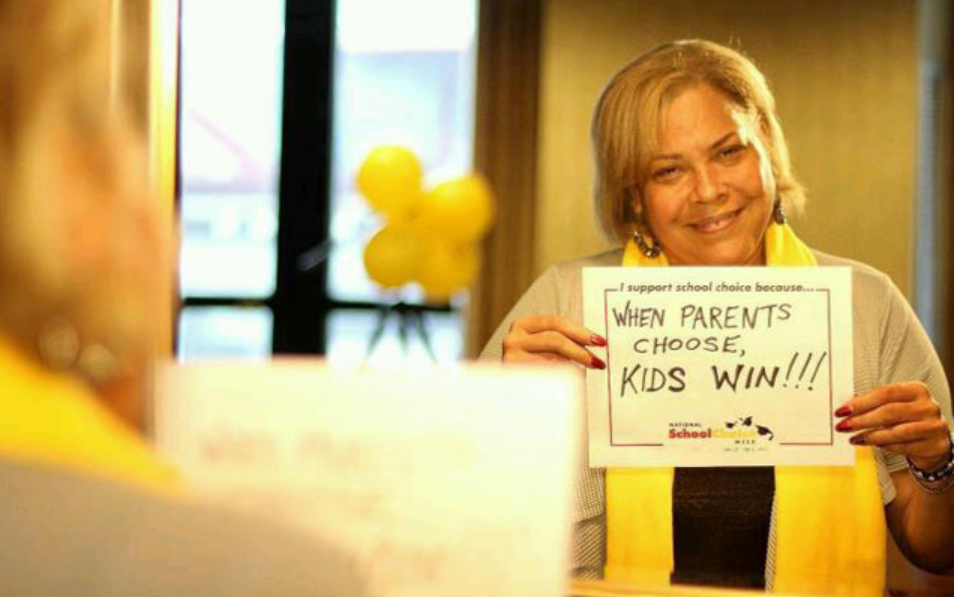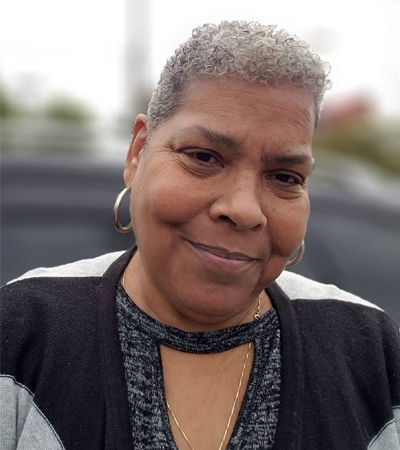
Education choice advocate Virginia Walden Ford served as the inspiration for a new independent movie that chronicles the creation of the Opportunity Scholarship Program in Washington, D.C.
Editor's note: For more than two decades, education choice advocate Virginia Walden Ford has tirelessly championed families and students living in lower-income neighborhoods to ensure that all children have the academic options they deserve.
After growing up in Little Rock, Ark., during the battle for school integration, Walden Ford led the fight for the Opportunity Scholarship Program in Washington, D.C. Her passion for education equality was ignited as she witnessed, as the single mother of three children, the need for more education choices for all families.
Now, her story has been made into a movie starring Uzo Aduba, Matthew Modine and Vanessa Williams. Step Up For Students, which hosts this blog, is bringing three free screenings of the film to Florida Dec. 8, 9 and 10 in Jacksonville, Orlando and Tampa, respectively. Walden Ford will be present at all three shows and will do a talk-back following the Tampa screening.
The Jacksonville and Orlando shows are sold out, but RSVPs are still being accepted for the Tampa screening here.
Step Up For Students advocacy coordinator David Hudson Tuthill recorded an exclusive interview with Walden Ford Tuesday in which she discussed her children’s diverse academic needs, the effect of neighborhood drug and gang activity on their learning, and her growing conviction that someone had to stand up and be the voice for children in the D.C. area and across the country.
We hope you enjoy the podcast.
By Virginia Walden Ford

Editor's Note: This is the first in a series of posts where various members of the choice community share an #edchoice wish.
As we fast approach 2019, I have been doing much reflection and taking a long look at the school choice/parental choice movement. I have remembered my own journey, which began by fighting for my son, and I have been in awe of the thousands of parents who joined me, in D.C. and around the country. In the 20 years I've been involved, so much has happened, mostly positive for children and families.There are 62 educational choice programs currently and successfully operating in 29 states and the District of Columbia.
It's been such an wonderful and encouraging 20 years. The parent soldiers of those early years are now seeing the children from those first programs, now young adults, go on to be successful in their lives. We fought hard and now we are seeing incredible results and receiving our rewards. But there are certainly some worries that we must be aware of in the future and we must address them.

When I became involved in the 90's, parent voices were insecure, anxious, sometimes not heard, often angry. Seldom did we hear positive stories about parental involvement in schools.
We went into the community and spent hours listening to the concerns of many parents who felt hopeless and helpless to do anything about the miseducation of their children. We spent a lot of time telling them to raise their voices and become involved in the process. We told them they had every right to speak up on behalf of their children and share their worries with those people who could make a difference … and to our joy and delight, parents listened to us!!!!
Then, as we began the school choice journey in earnest in the 90s, all of a sudden, parent voices were being heard clearly and loudly and suddenly they were empowered and respected and proudly participating in school choice legislative fights. Parental anxiety about how children were being educated in America's schools was finally being heard by teachers, administrators, legislators ... everyone! It was a wonderful time and as a result many programs that worked best for children materialized in this country.
Over the last couple of years, I've heard fewer and fewer of those excited, empowered voices of parents crying out for the best education possible for their children. Parents, unfortunately, have begun to feel that they are no longer needed in the fight to improve the education of Americas’ children.
There are many great organizations out there who are leading these legislative fights, but not really including parents as partners. Though parents respect the work being done for their children, they truly want to understand what’s going on and how they can help – but up front, not on the sidelines. Parents have said to me that unless there is a need for parents to be in “attendance” at a big rally or hearing, their role in the fight appears to be somewhat diminished.
That really makes me sad because those beautiful voices were and are still really vital in passing future legislation. Nothing makes me happier than seeing scores of parents standing shoulder to shoulder with supporters and legislators on behalf of their children.
So, my WISH is that once again, we, as parents, rise up together and make our voices heard. After all, we are the first teachers of our precious children and we must be their advocates because we know them best. And as always, we will stand tall and strong with all those who love and support our children.
Virginia Walden Ford is a leading national advocate for parental empowerment who helped spark creation of the Opportunity Scholarship school choice program in Washington D.C. She is the author of “Voices, Choices, and Second Chances” and the subject of an upcoming movie about her life.
COMING TOMORROW: redefinED's Assistant Editor David Hudson Tuthill implores his fellow progressives to stop the folly of fighting education choice for all.
A new poll finds that mothers of school-aged children aren’t happy with the direction of K-12 public education nationwide, and they are more likely to favor nontraditional, school choice options – like charter schools, private schools and the use of vouchers.
The telephone survey was commissioned by the Friedman Foundation and board member Virginia Walden Ford called attention to the findings about mothers: “No one knows better than a mom what education works best for their child, and mothers are crying out for more choices across our country.’’
Among the findings for moms with school-aged children:
• 61 percent said K-12 education has “gotten off the wrong track.’’
• 82 percent gave private schools an A or a B compared to 44 percent for public schools.
• 63 percent favored charter schools (once pollsters defined the schools), compared to 25 percent who opposed them.
• 69 percent supported tax-credit scholarships; 19 percent did not.
• 65 percent supported education savings accounts; 25 percent opposed the reform.
• 66 percent supported school vouchers (again, after they were given a definition of the program), compared to 26 percent who opposed them. School moms are more than twice as likely to agree (66 percent) with universal eligibility, but they mostly disagree (62 percent) when eligibility is limited to financial need.
• 54 percent favor a parent trigger policy compared to 38 percent who opposed the measure.
The survey also asked about education spending, with 65 percent of the moms saying per-student funding was too low and 35 percent believing public schools spent $4,000 or less per student. When they were informed that the national average was about $10,652 per student, the number of moms who thought the funding was too low dropped to 50 percent.
One of Arkansas’s top school choice advocates, Laurie Lee, is on the road this month in her home state, visiting 28 cities in four weeks to spread the gospel of education reform.
Arkansas ranked No. 5 among states in an Education Week report that gave it a B- overall. The national average was a C.
But look closer at the findings, said Lee in a phone interview, as she headed toward Mountain View. Arkansas netted a D for its K-12 achievement. Its graduation rate is 70 percent. And of those students who do graduate, 18 percent aren’t ready for college coursework, Lee said.
“Overall, our state’s economy is waning,’’ she said. “We’re losing jobs and foreclosure is high. And you can tie it all back to education.’’
That’s what led Lee to organize The Arkansas Reform Alliance or TARA, a grassroots nonprofit coalition that represents parents, educators and community leaders who want to increase school accountability and improve student success.
Expanding school choice is high on its list.
“We need more options,’’ said Lee, the alliance’s executive director. Her daughters were enrolled in public schools before she switched them to private, virtual and home education in search of the best fit.
Arkansas is home to 18 open enrollment charter schools and 14 district-conversion charter schools, public schools that were converted into charter schools, according to the state Department of Education website.
But to Lee’s group and others, that’s nowhere near enough. They want fewer restrictions on public school transfers. They want more charter and virtual programs. And they want tax-credit scholarships and vouchers. (more…)
 Last year, Indiana stole the spotlight for school choice. This year it was Louisiana. And next year, if Virginia Walden Ford has anything to do with it, it just might be Arkansas.
Last year, Indiana stole the spotlight for school choice. This year it was Louisiana. And next year, if Virginia Walden Ford has anything to do with it, it just might be Arkansas.
“Miss Virginia,” the heart and soul of the Opportunity Scholarship voucher program in Washington D.C., moved back to her home state of Arkansas last summer and slipped a bit off the national radar. But she didn't go to retire. She’s meeting with parents, talking with lawmakers – and making bold predictions.
Vouchers and tax credit scholarships in Arkansas are now “being seriously discussed,” Walden Ford, 60, said in a phone interview with redefinED. “I believe in 2013 there will be school choice legislation that will pass in this state.”
After three decades in the nation’s capital, Walden Ford said she wanted to be closer to her family (her mother is 90). But the daughter of public school educators also wanted to take the knowledge gained from 15 years of grassroots activism in D.C. and apply them to Arkansas, a state that does not have a voucher or tax credit program but may be ripe for a strong move in that direction.
Among the reasons: The University of Arkansas has a young but hard-charging Department of Education Reform, with nationally known voucher experts like Jay Greene and Patrick Wolf. The state’s leading newspaper, the Arkansas Democrat Gazette, has a reform-minded publisher. The state is earning a reputation, through indicators like Education Week’s Quality Counts report (where it ranked No. 5 this year) of being a state on the move. And constitutionally, it does not appear to have the legal hurdles that could snare choice programs in other states.
“The people here in reform in Arkansas are much further ahead than I had anticipated,” Walden Ford said. “I fought the D.C. fight so … I’m very much a realist. But this is what I’m seeing. I’m quite excited about it. I don’t think it’s going to be easy … but it’s on the minds of people now, legislators and citizens, that we have to change something.”
Are Democratic legislators among them? (more…)